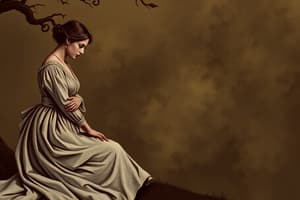Podcast
Questions and Answers
What was characteristic of the Romantic movement's attitude towards nature?
What was characteristic of the Romantic movement's attitude towards nature?
- It was viewed as a hierarchical order of the cosmos.
- It was seen as a static and unchangeable entity.
- It was believed to be a reflection of the divine spirit. (correct)
- It was considered a mere backdrop for human action.
What was the Romantics' reaction to the new bourgeois social and economic order?
What was the Romantics' reaction to the new bourgeois social and economic order?
- They sought to reform it from within.
- They wholeheartedly embraced it.
- They reacted against it with a sense of moral outrage. (correct)
- They were indifferent to it.
What literary forms did the Romantics revive?
What literary forms did the Romantics revive?
- Folktales and ballads. (correct)
- Epic poetry and tragedy.
- History and biography.
- Satire and comedy.
What did Wordsworth hold about the language of poetry?
What did Wordsworth hold about the language of poetry?
What did the Romantics associate with nature?
What did the Romantics associate with nature?
What did Coleridge refer to nature as?
What did Coleridge refer to nature as?
What is the primary focus of Coleridge's critique of Wordsworth's poetry?
What is the primary focus of Coleridge's critique of Wordsworth's poetry?
According to Coleridge, what is the key aspect of poetic genius?
According to Coleridge, what is the key aspect of poetic genius?
What does Coleridge mean by 'the riddle of the world'?
What does Coleridge mean by 'the riddle of the world'?
What is the significance of Coleridge's distinction between 'fancy' and 'imagination'?
What is the significance of Coleridge's distinction between 'fancy' and 'imagination'?
What is the result of poetic genius, according to Coleridge?
What is the result of poetic genius, according to Coleridge?
What is the ultimate goal of the poet, according to Coleridge's romantic ideals?
What is the ultimate goal of the poet, according to Coleridge's romantic ideals?
Flashcards are hidden until you start studying
Study Notes
Romanticism and the Bourgeois Order
- Romantics such as Blake, Wordsworth, and Shelley reacted against the new bourgeois social and economic order.
- They rejected the squalor and mechanized routine of cities, as well as the moral mediocrity of a bourgeois world.
- They turned to mysticism, nature, and Rousseauistic dreams of a simple life for spiritual relief.
Romantic Movement
- Wordsworth believed the poet should emulate the language of real life.
- He exalted the state of childhood and innocence of perception, untainted by conventional education.
- Romantic writers revived primitive forms such as the folktale and the ballad, influenced by growing nationalistic sentiments.
Nature in Romanticism
- Nature was not seen as an eternal, unchanging hierarchical order (as in neoclassical writers like Pope).
- Instead, nature was a living force, unified by the divine spirit, and infused with moral and emotional connection to human subjectivity.
- Coleridge referred to nature as the "language of God."
Imagination and Poetry
- Coleridge's Biographia Literaria critiques Wordsworth's theory of diction and discusses the theory of imagination.
- Romantic poetry combined deep feeling with profound thought, and a balance of truth in observation with imaginative faculty in modification.
- It aimed to spread a tone, atmosphere, and depth of the ideal world around observed forms and incidents.
Idealizing Childhood
- The Romantics sought to carry the feelings of childhood into adulthood, combining wonder and novelty with familiarity.
- Novelty and freshness were key aspects of poetic genius, where familiar objects were represented in a way that awakened fresh sensations in others.
Studying That Suits You
Use AI to generate personalized quizzes and flashcards to suit your learning preferences.




